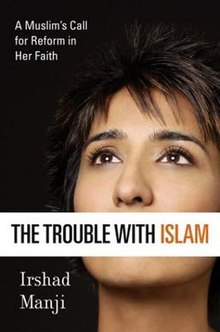The Trouble with Islam Today

Original cover of The Trouble with Islam today
|
|
| Author | Irshad Manji |
|---|---|
| Country | Canada |
| Language | English |
| Genre | Current affairs |
| Publisher | Vintage Canada |
|
Publication date
|
2005 |
| Media type | Book |
| Pages | 257 |
| ISBN | |
| 297 | |
| LC Class | BP169 .M285 2005 |
The Trouble with Islam Today, original title The Trouble with Islam is a 2004 book critical of Islam written by Irshad Manji, styled in an open-letter addressed to concerned citizens worldwide - Muslim or not.
In the book the author aims to provide an examination of what she describes as "the inferior treatment of women in Islam"; "Jew-bashing that so many Muslims persistently engage in", "the continuing scourge of slavery in countries ruled by Islamic regimes", "literalist readings of the Koran" and "the lost traditions of critical thinking (Ijtihad)".
In the book, Manji says that an Arab failure to accept the Jews' historical bond with Palestine is a mistake. Manji writes that the Jews' historical roots stretch back to the land of Israel, and that they have a right to a Jewish state. She further argues that the allegation of apartheid in Israel is deeply misleading, noting that there are in Israel several Arab political parties; that Arab-Muslim legislators have veto powers; and that Arab parties have overturned disqualifications. She also writes that Israel has a free Arab press; that road signs bear Arabic translations; and that Arabs live and study alongside Jews.
Translations:
The Trouble with Islam Today has been translated into more than 30 languages. Manji has made multiple translations of the book (namely Arabic, Urdu, Malay and Persian) available for free download on her website, with the intention of reaching readers in those countries where her book is banned.
Since its publication, the book has been met with both praise and criticism from Muslim and non-Muslim sources. Khaleel Mohammed, an imam and professor of Islam at San Diego State University, wrote in his foreword to Manji's book that "Irshad wants us to do what our Holy Book wants us to do: end the tribal posturing, open our eyes, and stand up to oppression, even if it's rationalized by our vaunted imams." On the other hand, M. Junaid Levesque-Alam claimed that the book ignored the scholarship by Jewish historians on Israeli ethnic cleansing against Palestinians. He also stated that the book is openly feted by Americans who have advocated war on Iraq and Iran.
...
Wikipedia
